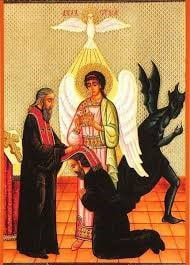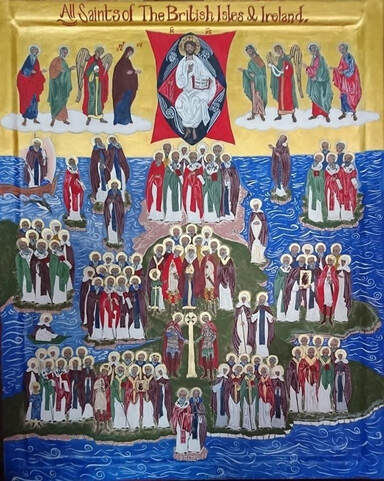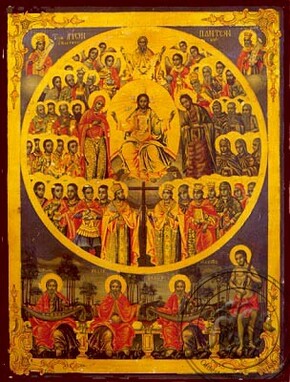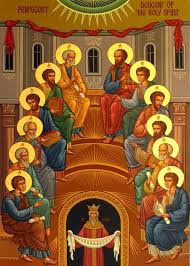 In my pastoral letter for 6th Sunday of Pascha (24 May) I mentioned the importance of the Sacrament of Confession. I should like to say more about this. Last Sunday, for All Saints of Britain, I talked about our being made in the image of God and, hence, icons (the Greek word for image) of Christ. Of course, if we likened this to one of our painted icons, we see the fading of age, paint chipped off, smudged areas, parts touched-up and the general result of wear and tear and weather. But yet it is clearly recognised, a hint of original beauty is still there, we recognise the image clearly. This well-worn icon has to be restored and can only be done through the hands of an expert iconographer. Pursuing this thought for ourselves, we too have to be restored and this must be done by the expert, even Christ Himself. When we go for the Sacrament of Confession, yes, we are in the presence of the priest, but the meeting is with Christ, and it is He who is there to restore. A question often raised is this, why should the Sacrament of Confession be necessary, when a private confession of sins should be enough? Some also say, is it not an alternative to counselling or psychotherapy? The answer to the latter is no, the Sacrament of Confession, is quite different to counselling and psychotherapy and yes, the Sacrament of Confession, with a priest is attendance, is necessary. We are of a complex make-up. Our very means of survival is for unpleasant, and stressful experiences, including sin, to be tucked away in the unconscious part of our mind, 'out of sight, out of mind’. Hence, we have to pray, before confession, that the Holy Spirit will enlighten the dark places of our heart, to enable us to make a full and honest confession. This is done more thoroughly when we have to stand with a priest in attendance. People will discover what a relief it is for these dark ‘secrets’ to be revealed, ‘found out’ , if you like. Our nature is to try very hard that we are not found out. We try not to be sinners with regard to each other and even to God Himself, so we can never jump out of the rut into true freedom without help. We make every effort, often and usually unconsciously, to hide or deny our sinful nature. Even if we do find time to make the effort to discover and confess privately, it is never complete. St Paul, when he had undergone his conversion and made his confession, never denied that he had been a real enemy of Christ, and the deeds he had committed were appalling. The Sacrament of Confession may be hard to face, yet we have to say, ‘This is what I am, and I am ashamed of it, I am sorry, and I want to start afresh’. Public Confession was initiated in the early Church because of the profound sense of Oneness, the sense of belonging together in Christ and in the Church. It was recognised that the Church could be wounded and disfigured by anyone's sinfulness or unfaithfulness. A person who had acted against the integrity of the Body, the integrity of its faith, had to confess because what was important was the matter of his salvation from death to life in the Body to which he belonged, and the healing of the whole Church. The reason why confession is so different from counselling or psychotherapy is because it is about restoring a person to life in Christ, restoring his full communion within the Body of Christ, the Church. As St Paul in 1 Corinthians 12, writes that the Body is one and has many members, we have all been baptised into the One Body which is Christ. No member can say to another, 'I have no need of thee’, all are necessary for the full life of the Body. Estrangement of one person from the Church by whatever means is a failure of love. The second lack of love is murder understood by Our Lord’s elaboration of this Commandment, ‘Whoever is angry with his brother without a cause…. whoever curses his brother (or belittles him) …is in danger of hell fire’ (Matt 5:21–22). The third sin highlighted by the early church was that of adultery because it is sin against the love God has given to two people. These sins are incompatible with belonging to the Church, the Body of Christ because as one Body, we live the life of Christ Himself and such healing and restoration to communion can only be brought about by Christ Himself. If by our sin we have wounded the Body of Christ, no healing is possible unless we go to Christ Himself for such healing and this is the purpose of Sacramental Confession. St James in his epistle (James 5:16) advises that all who are in need must come to confess sins to each other. This is directed towards the individual who has fallen away from integrity. It is a coming to Christ, in the presence of a man of prayer, 'And the prayer of the faithful will save the sick, and the Lord will lift him up. And if he has committed sin, he will be forgiven’ (James 5:14-16) When we come to confession, it is to Christ we come, not to anyone else, to Christ who has given Himself, His life and His death for our salvation. It is not the priest we are coming to. He stands there as the representative of the community, he stands in prayer and to his prayer is added the prayer of the whole community, 'the prayer of the righteous'. The priest is hearing the confession but not listening to it. He is simply holding the penitent to Christ and praying silently. He may, if he feels able, make some comment or give some advice but only if prompted to do so by God. He may say nothing but give the prayer of absolution, or he may say something that is helpful. The most important part of the confession is that the one making it is restored and forgiven, His sin has been put away by Christ who stands there representing the life of God the Father expressed so beautifully in the Parable of Prodigal Son, the Parable of the Loving Father always waiting for his son ( and daughter) to return and to be received with open arms and with love, now to be fully restored. The process is not a mechanical one. If we have made a good preparation and are prepared for the embarrassment and have the courage, we are integrated into the Christ's death and eternal life. What we have rejected and lost, of what God has given us, our faded image (icon) can now begin further restoration in the hand of the divine ‘iconographer'. As one priest said, ‘I go to confession because it is provided by the Church as a necessary aid to salvation’. Whatever else, it is certain that Sacramental Confession brings about the forgiveness, the restoration and the healing we require. Fr David
0 Comments
 Today we continue to remember All Saints and especially those of Great Britain. It is profitable to reflect on why we call them saints. What made them so? The first Apostles and Disciples had experienced the reality of our Lord’s Resurrection and the new understanding and life change they had now been given. Then, they experienced the outpouring of the Holy Spirit which gave them confidence, strength and ability to go throughout the world proclaiming the Good News of Christ. They emanated God in their lives as if the weaknesses and flaws of their own personality had been set aside. In due time, Saints arrived in Britain; St Aristobulos of the Seventy is acclaimed as Apostle to Britain in the Greek Synaxarion of Saints; one local tradition is that St Simeon Zelotes was crucified in Caister, Lincolnshire; of more certain tradition, we have St Alban who was martyred circa 209. Missionaries evangelised the British people with David of Wales, prominent among them. Following St Patrick, Columba became the Apostle to Scotland in the fifth century and St Aidan, Apostle to the north from 625 with his pupil, St Chad becoming for us the first English bishop in the Midlands. In every century there were saints who were convinced that Christ had Risen indeed and was with them to befriend, inspire and guide. They realised that they were made in God’ s image and were endeavouring to be transformed into the likeness of Christ by the indwelling and transforming action of the Holy Spirit. It was this Christlikeness radiating through them which enabled them to proclaim the Gospel with authenticity. Radiating from them was a compelling transforming power which impressed men and women and their leaders to turn to Christ. It is important for us to recognise this because we too are called into the same life of sainthood; this is the vocation of every Christian soul. We are made in the image of God; we are icons of Christ. That is why, in every Liturgy, the priests or deacon frequently censes every person in the church gathering after he has censed the painted icons. All are icons of Christ. Of course, sometimes the icon has faded with age, paint has become smudged or has been chipped off, the original has been defaced. Even so, it is still a genuine icon, its face still shines but now it is in need of restoration. Our Christian life is indeed the process of restoration. Metropolitan Anthony used to point out that when we read a passage of scripture or word of a particular prayer (all prayers have been written by saints) and we feel particularly inspired, then we must stay with that passage and savour it because, at that point, we and God are one and of one heart. These words are relevant for us in a very special and unique way. At that point we are akin to God and this passage which expresses our self must be kept because if we break with it, if we sin against it, we are destroying our self. We are not only stepping away from what God is saying to us, but we are acting against our self, our better self. We are failing to allow our icon to be restored. The Saint is the one who has had such experiences, over and over again, and cherishes each, reflecting upon it and savouring it until, by accumulation of being akin with God, over and over again, he/she is transformed into Christlikeness. He/she has truly become the icon of Christ he/she was always meant to be. Such persons become not only Christlike but also Christ in a different form. Their personality remains but now transfigured; their lives are enlightened with a radiance which enlightens all with whom thy come in contact. The icon of Christ within them shines out. This, then, is the witness of Saints and a reminder and encouragement to us that we are to be on the same path of saintliness. One famous Jewish Teacher said, that when we come to the Judgment Seat of God, He will not ask if we have become like King David, The Prophet Elijah or any other distinguished godly figure but have we become ourselves; transformed into what God want us to be. This is the saint we are to become, uniquely transformed from image into the likeness of Christ whilst becoming our greater and finer self, an icon restored. May God bless us in our understanding and our endeavour. Fr David  Matthew 10:32-33 New King James Version (NKJV) Confess Christ Before Men 32 “Therefore whoever confesses Me before men, him I will also confess before My Father who is in heaven. 33 But whoever denies Me before men, him I will also deny before My Father who is in heaven. Matthew 10:37-38 37 He who loves father or mother more than Me is not worthy of Me. And he who loves son or daughter more than Me is not worthy of Me. 38 And he who does not take his cross and follow after Me is not worthy of Me. Matthew 19:27-30 27 Then Peter answered and said to Him, “See, we have left all and followed You. Therefore, what shall we have?” 28 So Jesus said to them, “Assuredly I say to you, that in the regeneration, when the Son of Man sits on the throne of His glory, you who have followed Me will also sit on twelve thrones, judging the twelve tribes of Israel. 29 And everyone who has left houses or brothers or sisters or father or mother [a]or wife or children or [b]lands, for My name’s sake, shall receive a hundredfold, and inherit eternal life. 30 But many who are first will be last, and the last first.  Do you have a favourite Hymn? I am sure most of us do. I also have hymns that I struggle with. One such hymn for me is “Onward Christian Soldiers”. It is not so much the hymn itself but more to do with my inability to connect with the ‘Soldier’ concept. The thought of being a soldier ‘marching off to war’ just doesn’t work for me. However, I have for many years thought that I would very much like to be Samurai for Our Lord! Why Samurai? Well a significant part of the appeal is Bushido. This was the code of conduct for Japan's warrior classes from perhaps as early as the eighth century through modern times. The principles of bushido emphasized honour, courage, skill in the martial arts, and loyalty to a warrior's master (daimyo) above all else. Loyalty and honour to a master; is this not what is required if we are to confess Christ, if we are to love Christ before father or mother … The katana sword was first adopted as a Samurai blade in the late 13th century. Since then, katanas have become an iconic symbol of the Japanese Samurai tradition. Interestingly, if we look at the omitted verse 34 from our gospel reading our Lord says; “Do not think that I came to bring peace on earth. I did not come to bring peace but a sword.” The sword of Christ is of course the truth; The Truth about who He is as God and the truth about how to follow Him as Lord. A sword has a sharp blade for cutting and to be effective, must be wielded skilfully. It is crucial to ensure that what needs to be cut is cut swiftly and accurately. This is true for both the Samurai Katana and sword of Christ. A Samurai must study and work hard to be a skilled swordsman. One cannot just walk off the street, pick up a scalpel, call oneself a surgeon and begin operating. Rather, a surgeon is highly educated and trained, with many years of study and practice. These same principles are required of us if we are to use the sword of Christ be it to defeat an enemy, like a Samurai, or remove unnecessary or diseased parts, like a surgeon. A Samurai’s commitment to his vocation must be absolute. Would one expect a person to qualify as a surgeon if attendance at medical school was hit and miss, if attendance at lectures was infrequent or if the student arrived halfway through or near the end of the lectures? Or what if study books were rarely opened and studied at home? What if the student decided to do some other activity, when it was time to watch/help the attending surgeon? We each need to become skilled in cutting out the unnecessary and sinful parts of your life. In today’s Epistle reading (Hebrews 11:33 – 12:2), it says we must “Lay aside every weight and sin.” (v.12:1). Sin is like a spiritual cancer that needs to be cut out and excised. Because, unless it is removed, it will continue grow until it takes over and destroys the soul. When we know how to use the sword, we can effectively eliminate self-serving habits from our life. We can identify and prioritise that which is most important for our life. How can we possibly ‘confess Christ before Men’ if we rarely/irregularly attend His school—the Church? When we come late to class—the Divine Liturgy? When we rarely open His textbook—the Bible? As followers of Christ we too must be educated and trained in the ways of God before we can skilfully wield the sword of Truth. Like for many children, this is a time for home education. But soon we will again be free to join together for worship, to attend the vigil, to serve the liturgy. May we do all do this with joy and a new commitment of loyalty and honour to our master, skilfully using the sword of Christ knowing that “whoever confesses Me before men, him I will also confess before My Father who is in heaven” “Through the prayers of all our holy fathers, Lord, Jesus Christ, Son of God, have mercy on us”  So, what would you prefer; would you rather lose £10 or find £10? I think it is safe to say that we all experience ‘loss aversion’ that is our tendency to prefer avoiding losses to acquiring equivalent gains. Loss and giving up can be difficult concepts for us to accept, since both are often equated to failure and it has been suggested that losses are twice as powerful, psychologically, as gains. For many, if not all of us, loss and giving up have been a dominant feature of this pandemic period. There is however a different dimension to loss a giving up. I refer to the spiritual life. Let me take you back to the start of our life with Covid-19 (Coronavirus). Fr David shared his thoughts and the thoughts of Elder Zacharias of Essex with regard to ‘Hesychia’. This is a state when there is an inner stillness and one abides alone in spirit with God; attained only through loss and giving up! There is a story of a Japanese sage who served tea to an enquiring professor. The sage poured his visitor’s cup full, and then kept on pouring. The professor watched the overflow until he no longer could restrain himself. “It is overfull. No more will go in!”, he cried. “Like this cup,” the sage replied, “you are full of your own opinions and speculations. How can I show you anything unless you first empty your cup?” This Sunday is 8th Sunday of Pascha, Holy Pentecost and is followed by The Day of the Holy Spirit on Monday. Pentecost Sunday commemorates the coming of the Holy Spirit in the form of flames to the Apostles, as recorded in the New Testament in Acts, 2. The Holy Spirit allowed the apostles to speak in other languages through 'tongues of fire', and they started preaching the Gospel to the Jews who come to Jerusalem for the feast of Shavuot (Pentecost), a festival that celebrates the giving of the Ten Commandments to Moses on Mount Sinai. We recognise this day as the birth of the Church for two reasons. Firstly, the descent of the Holy Spirit completed the Trinity - the Father, the Son and the Holy Spirit - the basis of Christian theology. Secondly, it was the first time that the Apostles had preached to the masses. And so, Pentecost is a celebration. However, Henri Nouwen reminds us that … "We cannot celebrate Christmas when there is nothing new born here and now; we cannot celebrate Easter when no new life becomes visible; we cannot celebrate Pentecost when there is no Spirit whatsoever to celebrate. Celebration is the recognition that something is there and needs to be made visible so that we can all say yes to it.’ This is not a time of loss, of giving up or of emptying, but rather This is a time to celebrate the coming and receiving of the Holy spirit. At baptism/Chrismation we each had the name of the Holy Trinity invoked over us. We were washed clean of sin. And coming out of the baptismal font, for those of us who were baptized in the Orthodox Church, we immediately received the sacrament of Chrismation, we received the Holy Spirit. The Holy Spirit dwells in each of us. In the Orthodox Church this is the only prayer, among all the prayers of the Church, that is ad- dressed to the Holy Spirit and for the last 50 days we have ‘given up’ saying our introductory Prayer to The Holy Spirit “O Heavenly King, Comforter, Spirit of Truth, who art everywhere and fillest all things, Treasury of Blessings and Giver of Life: come and abide in us, cleanse us from all impurity and of thy goodness, save our souls.” The prayer is so important that we should preface all of our prayers with it! But arguably it is just as important that we remember and understand what it is we are saying and why. I therefore invite you, for the next few days to look at the Prayer to the Holy Spirit phrase by phrase; to perhaps use each phrase as a daily meditation. ------------------------------------------------------------------ Meditations on the Prayer to the Holy Spirit. O Heavenly King,
and cleanse us from all impurity --
Fr Julian |
Parish Blog
This mainly contains homilies and messages from our priests, although there is some scope to share thoughts and interesting articles which we may want to share with others Archives
October 2022
Categories |
 RSS Feed
RSS Feed